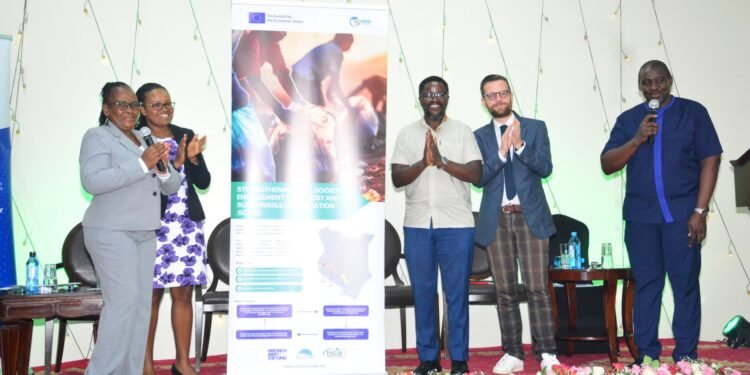Youth climate changemakers: Catalysing local action for urban sustainability
Today marked World Cities Day 2024, which is celebrated under the theme, “Youth climate changemakers: Catalysing local action for urban sustainability.”
To commemorate the day and build on the shared commitment to urban sustainability, the consortium of non-governmental organizations have today launched a project dubbed, Strengthening Civil Society Engagement for a Just and Sustainable Urbanization (SCEJU), a three year (2024-2026) action co-funded by the European Union.


The SCEJU project’s overall objective is to strengthen democracy and inclusive democratic processes in matters of urban quality of life, climate change, and biodiversity in Kenya.
The project consortium comprises the Friedrich-Ebert-Stiftung (FES-Kenya), the Civil Society Urban Development Platform (CSUDP), and the Pan African Climate Justice Alliance (PACJA).
The SCEJU project’s overall objective is to strengthen democracy and inclusive democratic processes in matters of urban quality of life, climate change, and biodiversity in Kenya.
Although Kenya enacted the Sustainable Waste Management Act 2022, which requires waste sorting at the household level, among other eco-friendly regulations, the compliance gap remains wide.
Furthermore, progressive reforms in the water sector, which largely privatized service provision, have not fully favoured the informal settlement areas where the majority of urbanites reside.
To promote sustainable water and waste management, FES-Kenya, CSUDP and PACJA, have received funding from the European Union (EU) to support the SCEJU project.
Bastian Schulz, the Country Representative, Friedrich Ebert Stiftung Kenya Office, says “PACJA, CSUDP and FES bring together vast experience from different sectors to work together to overcome existing barriers and make water and waste management not only more inclusive but also more sustainable and equitable”
Stronger voice, enhanced capacity and more just policies and policy implementation are the focus of our joint commitment. As we target Kisumu, Nakuru and Makueni counties, SCEJU aims to assist vulnerable urban communities, particularly women and youth, to address persistent challenges that threaten sustainable water and waste management despite constitutional guarantees.”He added
The 2024 World Cities Day theme, “Youth climate change makers: Catalysing local action for urban sustainability”, is apt as it places the youth as the key drivers in catalysing local action.
“SCEJU’s capacitation is aimed at unlocking the innovative potential that is inherent amongst the youth to drive change in the delivery of water and waste services within the informal settlements, which is adeliberate way of positioning the youth as climate change makers,” observed George Wasonga, CEO, and Civil Society Urban Development Platform.
This is the time to engage that young solid waste recycler, the entrepreneurial social media influencer, the young persons in and out of school, the artist and all. SCEJU envisage a cyclic interaction of people, planet and profit. That is why they are investing in this collaborative venture.
“Despite youth and women from urban informal settlements in Kenya providing the last mile services for a majority to access water and waste management, they remain incapacitated to harness opportunities in those sectors for decent jobs and are often excluded from policy decision-making processes that would empower them. Therefore, SCEJU seeks to capacitate and strengthen their voice to influence better outcomes for them and communities in Makueni, Nakuru and Kisumu
counties on sustainable water and waste management,” said Titus Kaloki, Programme Coordinator, Friedrich-Ebert-Stiftung, Kenya.


The SCEJU project’s overall objective is to strengthen democracy and inclusive democratic processes in matters of urban quality of life, climate change, and biodiversity in Kenya.
By amplifying the critical voices and innovative potential of youth, women and vulnerable populations, and facilitating platforms for stakeholder engagement in policy discourse, the SCEJU project aims to influence service delivery, policy and public discourse, ensuring that the needs and
perspectives of these groups are recognized, embraced and addressed.
Climate justice cannot be achieved without amplifying the voices of those who bear the heaviest burden of the climate crisis.
In Kenya’s urban informal settlements, vulnerable communities face daily challenges with water access and waste management – challenges that grow more severe with each passing year of climate change.


The SCEJU project’s overall objective is to strengthen democracy and inclusive democratic processes in matters of urban quality of life, climate change, and biodiversity in Kenya.
Through SCEJU, we are transforming this narrative by empowering youth, women, and vulnerable groups in Kisumu, Makueni and Nakuru counties to become architects of their climate-resilient future.
Youth mission goes beyond environmental solutions; it’s about ensuring that marginalized communities have an equal say in shaping sustainable urban policies that affect their lives,” noted Charles Mwangi, Head of Programs and Research, PACJA.
This public launch therefore aims to achieve the following objectives:
1) Bring together representatives of the project target groups (Youth, Women, Media Members (YoSUDA), Just and Sustainable Urbanization Platform (JSUP) and line
ministries and departments (national and county), media, and strategic partners to share the project vision, objectives, target areas, and expected outputs.
2) Facilitate networking and knowledge exchange amongst the project beneficiaries and implementing agencies
3) Increase the visibility of the project and its objectives to attract wider public interest including media involvement to help disseminate information and amplify the project’s
message to a broader audience.
The project will run for the next three years, in Kisumu, Nakuru, and Makueni counties in Kenya. The SCEJU project is deliberate on empowering Youth, Women and Vulnerable Groups living in urban informal settlements in the target counties, to enable them to tackle critical challenges in sustainable water and waste management.









